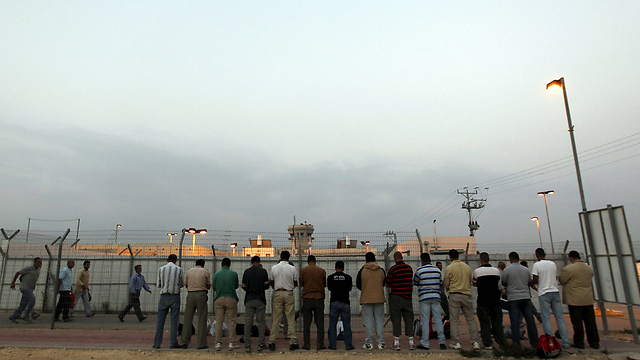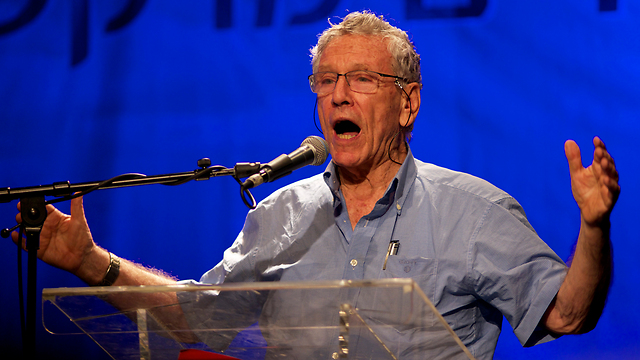Op-ed: The 50th anniversary of the Six-Day War is an opportunity to remember that the war broke out because of annihilation plans, before there even was an occupation. The Palestinians could have founded a state and improved their situation a long time ago, but have instead become completely addicted to victimization.
These are the days of the 50th anniversary of the Six-Day War, which many see primarily as the occupation festival. The Meretz faction decided to boycott a Knesset session, which—according to the faction’s chairman, Knesset Member Ilan Gilon—“blatantly and conspicuously ignores the occupation and the price it has claimed throughout the years in human life.”
This is the kind of claim I would expect to hear from MK Hanin Zoabi, not from Gilon. The occupation festival is being chanted—rightfully or not—almost incessantly. The 50th anniversary of the war is mainly an opportunity to remember that the war broke out because of annihilation plans, before there even was an occupation. And as for the price that has been paid in human life, I must say that every death is a tragedy, and I might also add that I doubt there is any other conflict that has claimed such a small price in human life.
Even a left-wing person like Gilon is capable of admitting these basic facts. And no, it does not contradict the battle waged by Gilon and others in favor of two states and/or against the current government’s policy.

As part of the festival, the Associated Press published a story about the difficult life of Fuad Maraita of the West Bank town of Salfit, who is forced to wake up at 3:30 am every morning to get to work in Israel. The report received wide circulation and was also published in the New York Times.
The distress experienced by Palestinian laborers is a fact. But when the press, which is supposed to be decent, ignores the fact that the fence between Israel and the territories is the result of terror, when it ignores the fact that the strip’s residents are distressed because Hamas prefers an industry of rockets and death over welfare and prosperity, when it ignores the fact that under Israel’s rule the Palestinians have also experienced many improvements and changes for the better, and when the same report ignores the fact that the Palestinians have repeatedly turned down any proposal which would have given them a state—this is mainly misguidance.
The United Nations secretary-general joined the festival. In a statement marking the 50th anniversary of the Six-Day War, Antonio Guterres mentioned that the decision in 1947 was to establish two states, but only the Jewish one was founded. Why? After all, there was no occupation until 1967, yet the Arab state wasn’t established. Since then, the Palestinians have been offered a state time and again and have always refused. So why the hell can’t the UN chief tell the truth? Why is it so difficult?
All these biases—by Meretz, by the media and by the UN chief—aren’t helping the Palestinians. They even contain some racism, because they are letting them off the hook. This is the way inferior natives are treated. This isn’t the way to treat a community which could have founded a state, chosen construction and improved its fate a long time ago, but has instead become completely addicted to victimization. And Meretz, AP and Guterres are helping this great deception. This is not the way to advance a solution to the Palestinian problem. This is only the way to perpetuate it.
The monster of fanaticism
In honor of Hebrew Book Week and the publication of his new book, Amos Oz is complaining about fanaticism in Israel and blaming the Ashkenazim. That’s interesting, because if we would ask an extreme rightist the same thing, he would say something very similar, only about Arabs.
At times, it seems that the fanaticism claims are the fanatic’s escape. But Oz is no fanatic. Far from that. And his statement symbolizes the place that the Left, even the sane Left, has marched and is marching towards. He is making a mountain out of a molehill. For years, part of the Left has been creating fake news on the deterioration of democracy, on the passion for killing civilians among IDF soldiers, on the political radicalization. The result is a fear of the monster of fanaticism.
This is nonsense. There are fanatical margins, both among Jews and among Israeli Arabs. Nothing more than margins. There is no proof that Israel is more fanatical today than it was, say, in the early 1980s. In the 1981 elections, a leftist was unable to enter Tel Aviv’s Carmel Market.

The claim that the Ashkenazim are fanatical and the Sephardim came from a tradition of moderation and good neighborly relations with the Arabs is a bit peculiar too. The Islamic countries’ Jews were inferior and suffered from persecution and harassment, and the Ashkenazim didn’t arrive with characteristics of fanaticism. It’s kind of sad that Oz is trying to rewrite history.
He is even rewriting the closer history. The Israeli public today is ready for much more political compromises than it was in the 1970s and 1980s. There is moderation, not radicalization. That applies to Israel’s Arabs as well. They haven’t become Zionists, but most of them are undergoing an Israelization process. Every year, there are more volunteers interested in doing national service. It’s true that incidents like the ones that took place in Umm al-Hiran and in Kafr Qasim create an opposite impression. But in-depth surveys, both those conducted by the Israel Democracy Institute and those conducted by Prof. Sammy Smooha, reveal moderation and a desire to fit in.
Precisely on the backdrop of the Israeli-Arab conflict, Israel is not a sea of fanaticism but a sea of sanity. In Sweden, which has much fewer problems, which has no years-long conflicts and which has a small Muslim minority, 600 neo-Nazis launched a violent march in Stockholm last November, and the radical right-wing party, which won 13% of the votes in the recent elections, is already leading the polls with 24 percent. There are violent riots and hooligans in other Scandinavian countries as well. One can only imagine what would have happened had their problems been similar to Israel’s.
These are the facts, but the herd of cliché declaimers about the end of democracy and about fanaticism won’t let these facts confuse them. Oz, as a man of thought, could have said something a bit more serious, but he is insisting on being part of the herd. What a shame.
As reported by Ynetnews
